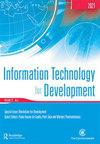IT Career aspirations in Bangladesh: a Trigger for development?
IF 5.1
3区 管理学
Q1 DEVELOPMENT STUDIES
引用次数: 3
Abstract
ABSTRACT Saxenian’s concept of ‘brain circulation’ explains how a developing country can benefit when its diaspora community returns home to accelerate economic growth, but it says little about who leaves a country in the first place, and why they leave. We consider this issue in the context of Bangladesh’s IT sector and focus on university students’ aspirations for careers abroad. Based on a survey of 591 undergraduate IT students, we find that students’ aspirations bifurcate into those hoping to work in English-speaking developed countries and those expecting to remain in Bangladesh, and that the difference correlates with parental income, attendance at elite universities, gender, and the presence of role models. We also find that parental income is predictive of what factors students value in a job. Findings are discussed in relation to socio-cognitive career theory, with implications for interventions that could improve IT brain circulation in Bangladesh and beyond.孟加拉国的IT职业抱负:发展的导火索?
摘要:萨克森尼亚人的“大脑循环”概念解释了当散居国外的社区回国加速经济增长时,发展中国家如何受益,但它几乎没有说明谁首先离开一个国家,以及他们为什么离开。我们在孟加拉国IT部门的背景下考虑这个问题,并关注大学生对海外职业的渴望。基于对591名IT本科生的调查,我们发现学生的愿望分为希望在英语发达国家工作的学生和希望留在孟加拉国的学生,这种差异与父母收入、精英大学的出勤率、性别和榜样的存在有关。我们还发现,父母的收入可以预测学生在工作中看重什么因素。研究结果与社会认知职业理论有关,对改善孟加拉国及其他地区IT大脑循环的干预措施有启示。
本文章由计算机程序翻译,如有差异,请以英文原文为准。
求助全文
约1分钟内获得全文
求助全文
来源期刊

Information Technology for Development
Multiple-
CiteScore
11.30
自引率
16.70%
发文量
34
期刊介绍:
Information Technology for Development , with an established record for publishing quality research and influencing practice, is the first journal to have explicitly addressed global information technology issues and opportunities. It publishes social and technical research on the effects of Information Technology (IT) on economic, social and human development. The objective of the Journal is to provide a forum for policy-makers, practitioners, and academics to discuss strategies and best practices, tools and techniques for ascertaining the effects of IT infrastructures in government, civil societies and the private sector, and theories and frameworks that explain the effects of IT on development. The concept of development relates to social, economic and human outcomes from the implementation of Information and Communication Technology (ICT) tools, technologies, and infrastructures. In addition to being a valuable publication in the field of information systems, Information Technology for Development is also cited in fields such as public administration, economics, and international development and business, and has a particularly large readership in international agencies connected to the Commonwealth Secretariat, United Nations, and World Bank.
 求助内容:
求助内容: 应助结果提醒方式:
应助结果提醒方式:


